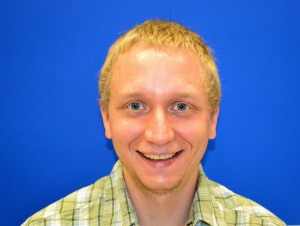 Joshua Sunday is a Senior majoring in Computer Engineering.
Joshua Sunday is a Senior majoring in Computer Engineering.
What sort of research are you doing? Bioelectronics. My current work focuses on design and cleanroom fabrication of electronic devices that will be used by my group to interface with neurons. Once this is completed, I will concentrate on processing the signals that are generated across the fabricated microchip. I am hopeful that my research will help contribute to the work that is being done to help fight neurological disorders.
How long have you been doing this research? What inspired you to become involved/ how did you become involved? I have been part of Dr. Slaughter’s lab since the end of the Spring 2011 semester. I became involved with Dr. Slaughter because I had a class with her and during this time, I learned that she was in the process of starting a bioelectronics lab on campus. Bioelectronics has been something that has always interested me and I thought that her lab would give me the opportunity to explore a topic that I have interest in pursuing as a future career.
Is this your first research project? Yes, this is my first research project.
How much time do you spend doing research? When school is in session, I spend approximately 20 hours a week researching, depending on my course load. When school isn’t in session, I spend approximately 40 hours a week researching.
Are you collaborating with any other students or faculty members? Along with Dr. Slaughter, I am collaborating with Patrick Macatangga, a senior computer engineer, Rachel Davies, a senior chemical engineer and Jonathan D’Angelo, a senior interdisciplinary studies student who is focusing on Neural Engineering.
Do you plan to become involved in URCAD? Or, are you being supported by any scholarships or fellowships? I would like to present my research in URCAD this year.
What is the best part of your research so far? I really enjoy working on a topic that is interdisciplinary because it allows me to branch out and explore topics that I don’t have the opportunity to study within my major. I am also enjoying taking what I have learned during my studies and applying it to real life applications. Finally, I enjoy the freedom that Dr. Slaughter has given my group to formulate our own project from the ground up.
What is the biggest obstacle you have faced while doing research so far? The biggest obstacle that I have faced is learning to understand a lot of biology and chemistry. I am not exposed very much to either discipline as a Computer Engineer and many of the papers that I read and the research that I perform involves topics such as these. That being said, I am enjoying developing an understanding of these topics and combining it with what I have learned from the classes that I have taken as a Computer Engineer to be able to do research that has foundations in many different disciplines.
What do you hope to achieve with this research? I hope that my research will be used to further the advancements in bioelectronics. I feel that it’s a revolutionary field that is helping to evolve global wellbeing and will continue to improve and assist our advancements in medicine. Generally speaking, I am looking to develop invaluable experience that will prepare me for a future career.
Do you feel like this research is preparing you for post-college plans? I feel that my research is greatly preparing me for post-college plans. I am developing teamwork skills, leadership skills and learning to handle responsibility while researching a topic that not only deals with my major, but is one that I truly enjoy.
What are your plans after graduation? After graduation, I would like to attend grad school and continue research in a similar field.
*Joshua was interviewed in September 2011.